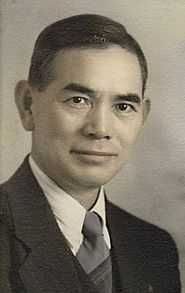Henry Hajimu Fujii facts for kids
Quick facts for kids
Henry Hajimu Fujii
|
|
|---|---|
 |
|
| Born | August 17, 1886 Takashiro, Tottori Prefecture, Japan
|
| Died | November 2, 1976 (aged 90) Nampa, Idaho, United States
|
| Occupation | Farmer, lapidary, spokesman |
| Spouse(s) | Fumiko (Mayeda) Fujii (1891-1984) |
| Children | 6 |
Henry Fujii (born August 17, 1886 – died November 2, 1976) was an important Japanese American leader in Idaho. He was known for his farming skills. Henry Fujii helped many people in his community.
In the 1930s, Henry Fujii became famous for growing lots of onions. He found new ways to farm large areas of land. In 1936, he started the Japanese Onion Growers Association. He was the president of this group for more than 30 years.
During World War II, many Japanese Americans were forced to move. This was called the Japanese American internment. But Henry Fujii lived in Nampa, Idaho, which was not on the West Coast. So, he was able to stay in his home. Even though he faced unfair treatment, he kept helping his community. His strong leadership helped protect the rights of Asian people in the Northwest United States.
The Emperor of Japan gave Henry Fujii a special award. It was called the 6th Order of the Rising Sun, Silver Rays. This award honored his hard work. It showed how much he helped improve the friendship between Japan and the United States.
After he retired, Henry Fujii started collecting rocks and gems. He gathered one of the biggest collections in the Northwest. In 1974, he gave some of his collection to the State of Idaho. The governor, Cecil D. Andrus, accepted the gift. The rest of his amazing collection went to the Idaho Museum of Mining and Geology in 1994. You can still see "The Fujii Collection" on display in Boise, Idaho.
Henry Fujii's Early Life and Journey to America
Henry Fujii was born Hajimu Fujii on August 17, 1886. He grew up in Tottori Prefecture, Japan. He was the fifth son in his family. As a boy, he helped his family farm rice and raise silkworms. Their farm was about 3 acres (12,000 m²) big.
When he was in high school, Henry and his friends decided to move to America. Hajimu's name means "The Beginning." He couldn't go right away because of an eye infection. So, his friend Katsuji Hashitani went to America alone. Henry taught school for a year. Then, he borrowed $500 to pay for his trip.
In April 1906, Henry left Japan on a ship called Keemun. After 18 days, he arrived in Victoria, British Columbia, Canada. He then took a train to Vancouver, British Columbia. Finally, he reached Seattle, Washington on May 1. There, he met his friend Hashitani. Hashitani told him that his Japanese name was hard for Americans to say. So, Hashitani had started using the name Henry. Hajimu didn't know many American names, so he decided to use Henry too.
In December 1908, Henry Fujii teamed up with Hashitani and George Shigeya Takeuchi. They rented an 80-acre (320,000 m²) farm and a house. This farm was in Emmett, Idaho. They grew vegetables and fruit. They delivered their produce by horse and wagon to Emmett and a nearby gold mine camp called Pearl, Idaho. During the winter, when they couldn't farm, they studied English. A local church pastor taught them three nights a week.
Within five years of coming to the U.S., Henry had paid back the $500 he borrowed. He also saved $500. This money helped him go back to Japan to get married. On December 29, 1911, he married Fumiko Mayeda. She was born on July 12, 1891, in Okayama Prefecture, Japan. Her father was a history teacher whom Henry had admired. Henry returned to the U.S. with his new wife on the SS Inaba Maru. They arrived on April 23, 1912.
Fighting for Land Rights
Henry Fujii worked hard to change unfair laws. These laws stopped Japanese immigrants from owning land. In 1915, a law like this was suggested in Idaho. Eight years after joining the Japanese Association of Western Idaho (JAWI), Henry Fujii became its president. He led this group for 26 years. The association helped with things like trips to Japan, marriages, funerals, and buying property.
One of the biggest problems for the JAWI was the "alien land law." States like California, Oregon, and Washington had laws that stopped Japanese people from owning or renting land. Idaho's five Japanese associations joined together. They chose Henry Fujii and others to fight a similar law in Idaho. This team worked hard to delay the law. They managed to defeat it. Then, they helped create a new law. This new law allowed Japanese immigrants to rent land for up to five years, and they could renew the lease. Because of this, Idaho was the only Western state where Japanese immigrants could still lease land after 1923.
 | Sharif Bey |
 | Hale Woodruff |
 | Richmond Barthé |
 | Purvis Young |

